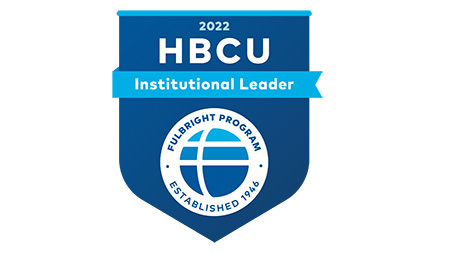Fayetteville State University Named 2022 Fulbright HBCU Institutional Leader

Fayetteville, N.C. September 19, 2022 — Fayetteville State University (FSU) is proud to be named as a 2022 Fulbright Historically Black College and University (HBCU) Institutional Leader for the third year in a row.
Fulbright HBCU Institutional Leaders demonstrate noteworthy support for Fulbright exchange participants and promote Fulbright program opportunities on campus, so more students and faculty may benefit from the U.S. government’s flagship international academic exchange program. This is the third year the U.S. Department of State’s Bureau of Educational and Cultural Affairs (ECA) is recognizing selected HBCUs’ strong engagement with the Fulbright Program.
The State Department made the announcement of the 19 Fulbright HBCU Institutional Leaders as HBCU leaders prepare to gather in Washington, D.C., and virtually for the White House Initiative on HBCUs’ National HBCU Week Conference. Fulbright opportunities will be highlighted in events such as the career and recruitment fair during the week of September 19-23.
Assistant Secretary of State for Educational and Cultural Affairs Lee Satterfield commended the HBCUs receiving the Fulbright HBCU Institutional Leader designation this year, noting that “HBCUs are an important part of the American and global higher education communities, providing life-changing exchange opportunities for American and international students, faculty, and administrators alike,” and shared her “hope that these institutions’ success encourages all HBCUs to engage further with Fulbright and with the State Department.”
“It’s extremely gratifying to be recognized for the third time by the Fulbright Program for FSU’s domestic and global engagement initiatives,” said FSU Chancellor Darrell T. Allison. “We are dedicated to ensuring that our faculty and students can pursue international collaboration and enrichment experiences which they bring back to campus for the benefit of our whole community. This is yet another layer of academic excellence that helps prepare our students for global citizenship, and we are thrilled to contribute to global conversations this way.”
FSU Fulbright Program participants or guests include:
Todd S. Frobish, Ph.D., professor and chair of FSU’s Department of Communication, Languages and Cultures in the College of Humanities and Social Sciences, received a Fulbright International Education Administrators (IEA) award to help build global relationships, support international students and encourage prospective study-abroad students.
Afua Arhin, Ph.D., dean of FSU’s College of Health, Science and Technology, received a Fulbright U.S. Scholar Program award in Nursing for the 2022-2023 academic year to conduct research around infant nutrition in developing countries.
Maurice Mongkuo, Ph.D., professor of public administration in FSU’s Department of Intelligence Studies, Geospatial Sciences, Political Science and History, received the 2019 Fulbright Specialist Fellows Program award to visit Russia and was placed at Altai State University, a public research university in Barnaul, Russia. Mongkuo was there for four weeks during which he presented lectures and workshops for students, faculty and community stakeholders.
FSU hosted Fulbright Scholar-in-Residence Chaynie Williams, M.D., during the 2021-22 academic year. Williams is an emergency physician specialist and medical services clinical director at Queen Elizabeth Hospital in Barbados.
On November 3, a Fulbright HBCU Virtual Workshop will feature representatives of Fulbright HBCU Institutional Leaders sharing best practices for HBCUs to leverage Fulbright Program engagement to support students and faculty, increase campus internationalization, and build global networks. This event is open to the public and is specifically designed for HBCU faculty, staff, and stakeholders.
The Fulbright Program is the U.S. government's flagship international academic exchange program. Since its inception more than 75 years ago, the Fulbright Program has given more than 400,000 talented and accomplished students, scholars, teachers, artists, and professionals of all backgrounds and fields the opportunity to study, teach, and conduct research abroad, exchanging ideas, and contributing to finding solutions to important international problems.
Each year, the U.S. Congress appropriates funds to the U.S. Department of State to sponsor the Fulbright Program. Many foreign governments contribute substantially as well. Additional funding and in-kind support are provided by U.S. and foreign host institutions, non-governmental organizations, private organizations, corporate partnerships, and individual donors.
Over many years, the Fulbright Program has designed and implemented a wide range of initiatives to increase participant diversity and inclusion. The program strives to ensure that its participants reflect the diversity of U.S. society and societies abroad. Fulbrighters come from all backgrounds and are selected through an open, merit-based competition, regardless of their race, color, national origin, sex, age, religion, geographic location, socio-economic status, disability, sexual orientation, or gender identity. Information on the Fulbright Program’s diversity and inclusion initiatives is detailed on the Fulbright U.S. Student Program website.
For more information on the Fulbright Program, visit http://eca.state.gov/fulbright or contact the Bureau of Educational and Cultural Affairs Press Office by e-mail ECA-Press@state.gov.
Stories about the positive impact of the Fulbright Program over its first 75 years can be found at: https://fulbright75.org
